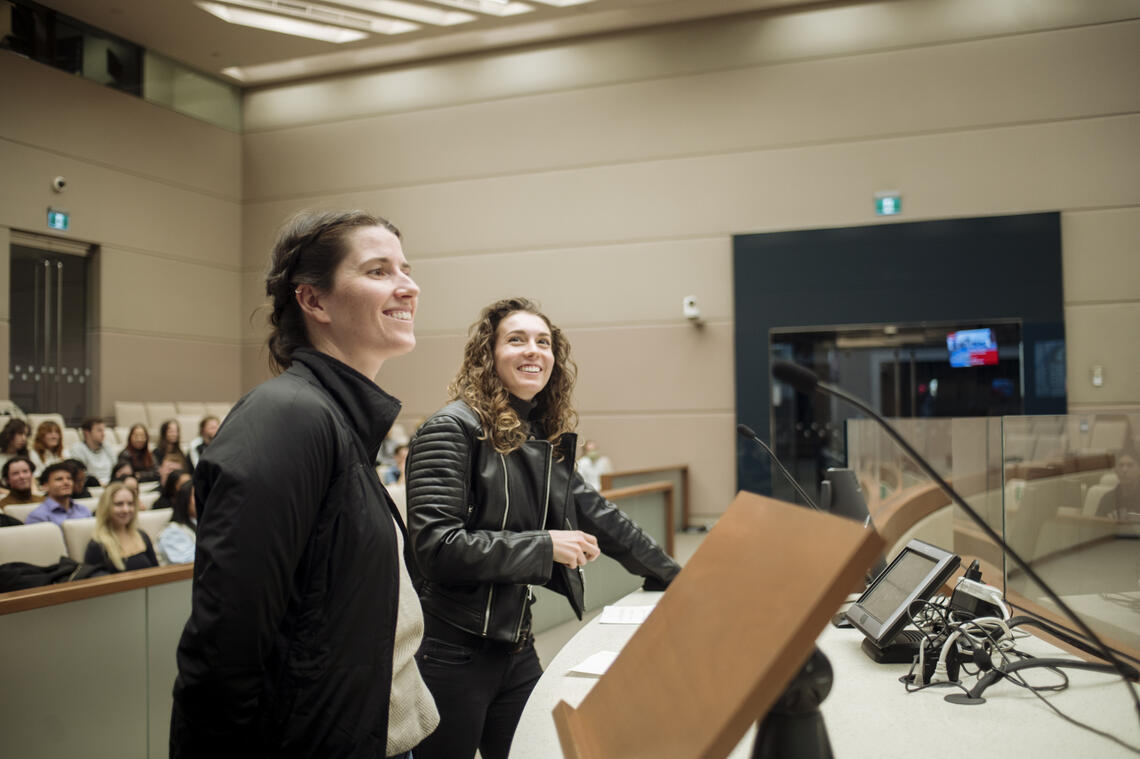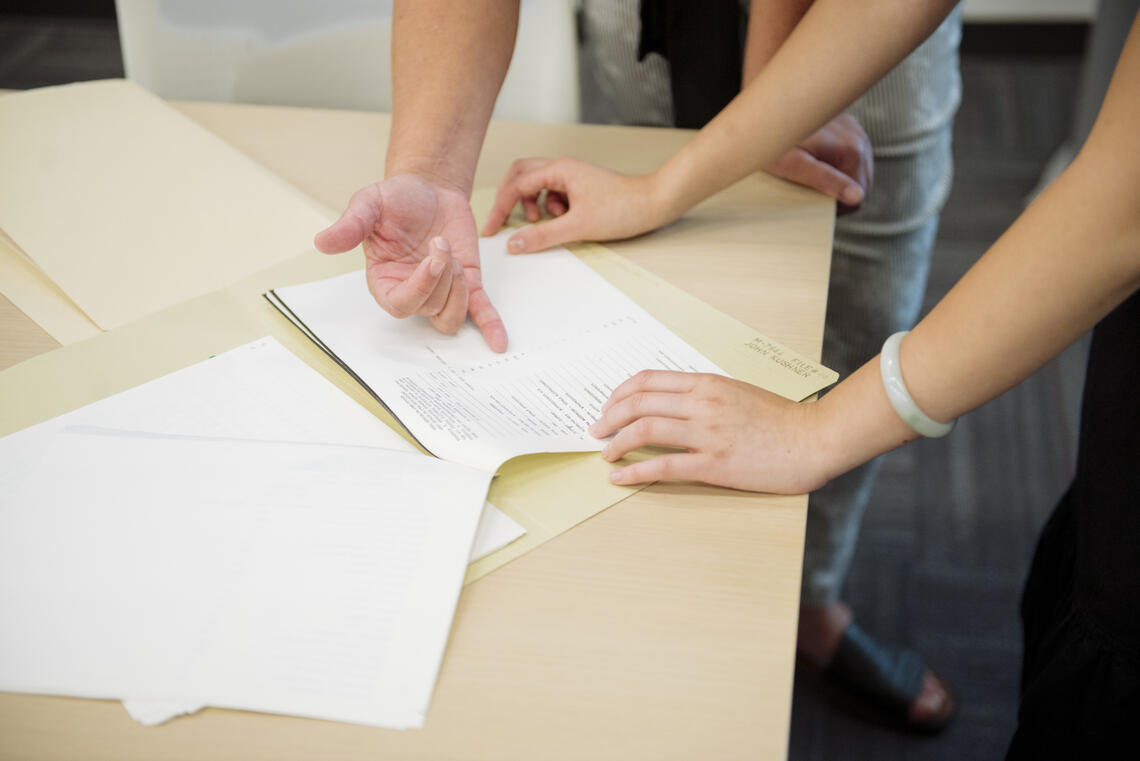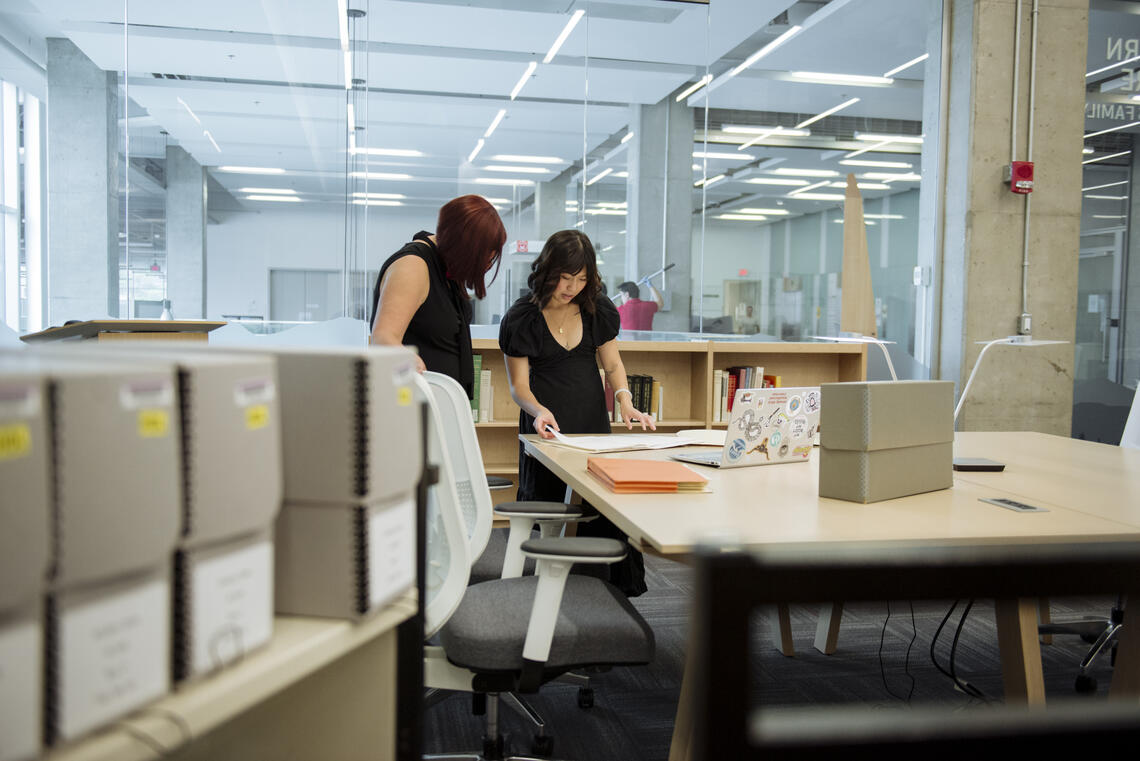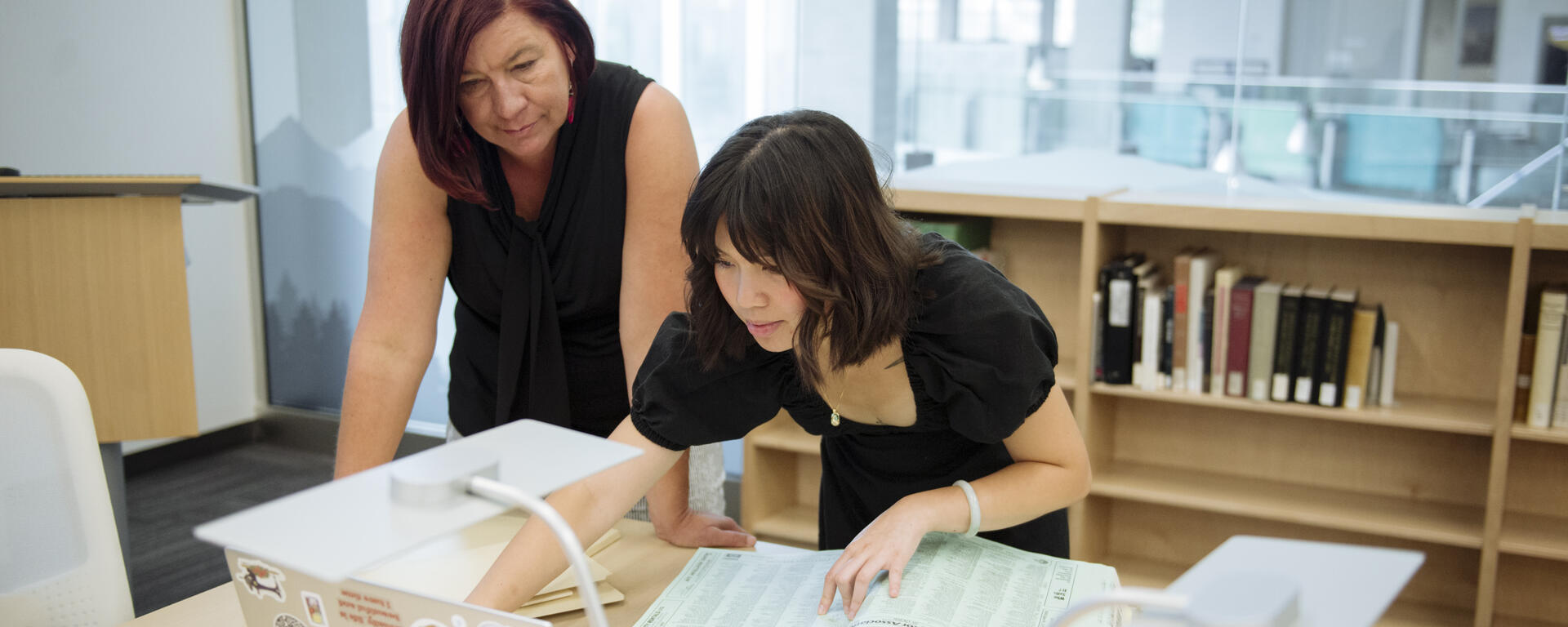At the end of the day, it’s nice for the students to have something that doesn’t just sit on a shelf somewhere. I really try with my students to get their ideas out there.
Andrew Sedor
UCalgary instructor, Urban Studies 451

Students Mhairi McGuigan and Annica Best present in front of classmates to a panel of experts inside council chambers at city hall as part of their Urban Studies class.
Elyse Bouvier
Dive deeper
Explore teaching and learning grants to further your knowledge of experiential learning.
Have more questions? Email our team to find more ways to get involved with EL scholarship.
Getting started
Experiential learning (EL) improves students' learning outcomes and provides a space where they can safely try new things. Start bringing EL into your classroom with these tools developed at the Taylor Institute for Teaching and Learning:

Dr. Nancy Janovicek and undergraduate research student Katie Qin look at primary sources together in the Glenbow Western Research Centre.
Elyse Bouvier
At the beginning of the term, some students are terrified of performing, but it is remarkable to see how students evolve during this one week by gaining confidence and finding their voice. It leaves them with a certainty to pursue a career in law.
Lisa Silver, LLM'01, Faculty of Law, on Block Week course LAW 602: Advocacy
Undergraduate Research
The College of Discovery, Creativity and Innovation brings the Undergraduate Research Initiative to UCalgary. The initiative will advance undergraduate research experience across our academic community. The initiative focuses on three areas:
- Curricular course-based undergraduate research experiences (CUREs)
- Non-curricular undergraduate research experiences (Undergraduate Research Summer Studentships)
- Undergraduate research events, engagement and outreach (in partnership with academic units, the Vice-President Research portfolio and the Students’ Union)
A Guide for Undergraduate Research Experiences
A guide for instructors or research mentors on designing curricular undergraduate research experiences or supporting undergraduate research in an apprenticeship model.
Explore the guide >>


Supervising summer research students
Undergraduate Research Summer Studentships provide up to $7,500 of financial support to University of Calgary undergraduates to conduct research for 8, 12, or 16 weeks between May and August. The experience provides students an opportunity to conduct research in collaboration with faculty members, learn about the research process, and discover how they can contribute to and participate in a community of researchers.
Role of the supervisor
As a summer student research supervisor, you will:
- Be entered into the pool of reviewers and review the summer studentship applications from students other than your own.
- Mentor undergraduate students in completing an existing or student-proposed research project.
- Supervise undergraduate student researcher(s) who are financially supported and receive professional development with quality workshops and resources through the PURE program
- Be part of a research awards program that combines curiosity, discovery, creativity and reflection into an immersive experiential learning opportunity.
How does summer studentship supervision work?
The supervisor of a summer studentship award holder is expected to mentor and support the student, providing an opportunity for the student to learn and develop research skills. The supervisor is to ensure the student can conduct their research experience in a safe and ethical environment, following procedures and rules of the University of Calgary and, if applicable, those of the specific research environment in which the student is engaged. The supervisor is to meet regularly with the student, and provide regular feedback and support to the student and the student's research project. The supervisor is to review and approve the student's final report to ensure the report adequately explains the award holder's research successes and challenges.
Students may have supervisors from their own faculty or from different faculties. Supervisors must be full-time UCalgary Academic Staff (Faculty and Researchers) with continuing appointments.
Eligible full-time staff members include assistant, associate, full professor, assistant, associate, and full professors (Teaching), clinical faculty appointments, librarians, archivists, and curators.
UCalgary academic staff who are not on a continuing appointment can co-supervise but will require an eligible academic staff member to be listed as the primary supervisor for the application. Staff who are not full-time include sessional or affiliated instructors, postdoctoral fellowship holders, guest postdoctoral scholars, adjunct professors and instructors, postdoctoral associates, and professor emeritus.
To create the maximum number of opportunities for students and supervisors, a supervisor may oversee up to three students in the application system.
The Program for Undergraduate Research Experiences is for UCalgary students only but there are some awards available to students from other universities. Please check the requirements of specific awards (you can see the list here).
Professors are not required to provide additional money to supplement the award. If they do so, it is at their discretion.
- Find a student
Students are encouraged to approach faculty members for research supervision. Supervisors are welcome to approach students with a research opportunity. - Support your student's application
Find out more about the format of the application and the rubric that will be used to evaluate each submission. - Student submits their application
Ensure your student submits their application by the deadline. Once they submit, you will receive an email to your UCalgary account with a link to submit your portion of the application. - Submit your reference
Ensure you submit your portion of the application by the deadline.
The primary adjudication of summer studentship proposals is done by faculty-based committees. Each application is reviewed independently by two faculty members who have a relevant area of expertise. Based on these reviews, all of the proposals are ranked and submitted to a committee that uses the faculty-based assessments in determining the recipients. Decisions of the committee are final and cannot be appealed.
All research involving human participants, animal use and the handling and storage of bio-hazard materials must be reviewed and approved by the appropriate University Board or Committee before research commences.
Experience Catalogue

The Experience Catalogue is a place for students to find opportunities to expand their academic knowledge with experiential learning — work-integrated learning, clubs, micro-credentials, case studies, and more are all part of the opportunities students can find in the catalogue. There are six categories — or types — that activities can be grouped under: research opportunities and research awards; work-integrated learning; clubs and recreation; events, workshops, conferences and competitions; entrepreneurship and innovation; and international.
Staff are encouraged to post all kinds of experiences to the catalogue.
To add to the Experience Catalogue:
- Prepare your content. You will be asked to provide a title, description, and a call-to-action link to a website or application for your experience.
- Sign in through your staff account on Elevate. Faculty and staff are able to sign in through the SSO system. If you are having troubles, please email experientiallearning@ucalgary.ca.
- Under the Staff sidebar, click Add to Experience Catalogue. You will be guided through the process of adding your opportunity.

